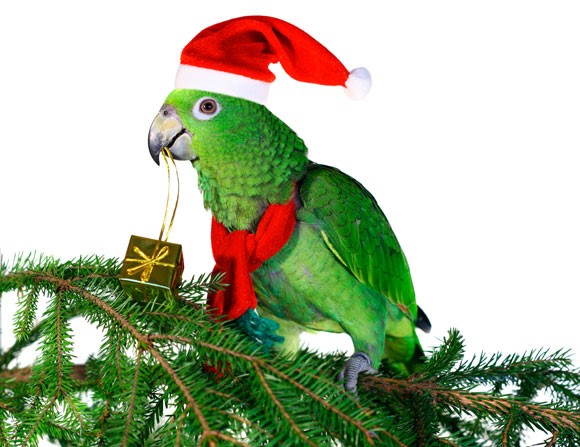
As Christmas approaches, it’s a time for indulgence, celebration, and sharing meals with loved ones. While it’s tempting to include your parrot in the festive fun, it’s crucial to ensure their safety by avoiding certain foods that can be harmful to them. This guide outlines the foods your parrot should avoid during the holiday season to keep them healthy and happy.
The Temptation of Sharing Holiday Treats
It’s not uncommon for pet owners to share food with their pets, even though they know it might not be the best idea. Around 20% of pet owners admit to feeding their pets from their plates, and this tendency often increases during special occasions like Christmas. In fact, nearly half (49%) of pet owners allow their pets to indulge in festive foods, considering them part of the family despite the risks.
However, it’s important to resist the temptation to share potentially harmful foods with your parrot. Here are five specific items to avoid to ensure your parrot’s safety this Christmas.
1. Chocolate
Chocolate is a staple in many households during Christmas, from festive chocolates to chocolate-covered treats. However, chocolate is toxic to parrots due to theobromine and caffeine content. Even a small amount can cause serious health issues, including hyperactivity, heart problems, and seizures. Keep all chocolate out of reach of your feathered friend.
2. Salted Foods
Many holiday snacks are high in salt, such as salted nuts, crisps, and various festive nibbles. Parrots have a low tolerance for salt, and consuming salty foods can lead to dehydration, kidney dysfunction, and other serious health problems. Ensure that your parrot’s diet remains low in salt to avoid these risks.
3. Alcohol
Alcohol is a common part of Christmas celebrations, whether in the form of mulled wine, cocktails, or festive beers. However, alcohol is extremely dangerous for parrots. Even a small sip can cause intoxication, respiratory failure, and potentially fatal consequences. Always ensure your parrot has access to fresh water and never let them near alcoholic beverages.
4. Nutmeg
Nutmeg is a popular spice used in many holiday recipes, from eggnog to gingerbread cookies. However, nutmeg contains myristicin, a compound that is toxic to many pets, including parrots. Ingestion of nutmeg can lead to symptoms like disorientation, increased heart rate, and seizures. Keep nutmeg and foods containing it out of your parrot’s reach.
5. Festive Plants: Christmas Trees, Holly, Ivy, and Mistletoe
While you might not be tempted to nibble on these plants, they can be very appealing to your curious parrot. Many festive plants, including real Christmas trees, holly, ivy, and mistletoe, pose significant risks if ingested. These plants can cause gastrointestinal distress, and some can be toxic, leading to severe health problems.
- Christmas Trees: The sap from Christmas trees is difficult to remove from feathers and can be toxic. Trees that have been outside may harbor parasites or other harmful organisms.
- Holly, Ivy, and Mistletoe: These plants can cause vomiting, diarrhea, and other serious health issues if ingested by your parrot. Ensure these plants are kept well out of reach.
Additional Foods to Avoid
The list of harmful foods doesn’t end with the five mentioned above. Here are a few more to watch out for:
Avocado and Guacamole
Avocado contains persin, a fungicidal toxin that is dangerous to parrots. Even a small amount can cause heart damage and other severe health issues. Avoid feeding your parrot avocado or dishes containing it, such as guacamole.
Caffeine
Caffeinated beverages like coffee, tea, and soda can be harmful to parrots. Caffeine stimulates the heart and nervous system, potentially leading to hyperactivity, cardiac distress, and even death. Always provide fresh water and avoid allowing your parrot to drink anything caffeinated.
Dairy Products
While not inherently toxic, most dairy products are high in fat and can cause digestive issues in parrots. Birds lack the enzyme lactase needed to digest lactose, the sugar found in milk. If you choose to offer dairy, do so sparingly and only as an occasional treat.
Tips for a Safe and Enjoyable Holiday Season
Provide Parrot-Friendly Treats
Instead of sharing harmful human foods, prepare special parrot-friendly treats for your feathered friend. Fresh fruits, vegetables, and specially formulated bird treats are excellent choices. These can be presented in festive ways to make your parrot feel included in the celebrations.
Supervise During Meal Times
When you’re enjoying your holiday meals, keep a close eye on your parrot. Supervision ensures they don’t accidentally ingest something harmful. If possible, keep your parrot in their cage or a designated safe area during meal times to prevent any accidental nibbles.
Educate Guests
If you’re hosting guests during the holidays, educate them about the dangers of feeding your parrot certain foods. Ensure everyone knows which treats are off-limits and encourage them to interact with your parrot in safe and appropriate ways.
Maintain Regular Feeding Routines
Holidays can disrupt regular routines, but it’s important to maintain your parrot’s regular feeding schedule. Consistency helps reduce stress and ensures your parrot receives the proper nutrition they need.
Use Parrot-Safe Decorations
When decorating your home, opt for parrot-safe materials and avoid items that can be harmful if chewed or ingested. Avoid using tinsel, small ornaments, or anything that could pose a choking hazard. Safe, non-toxic decorations ensure a festive yet secure environment for your bird.
Conclusion
Christmas is a time for joy and celebration, and it’s natural to want to include your parrot in the festivities. However, it’s crucial to be mindful of the foods and substances that can be harmful to them. By avoiding chocolate, salted foods, alcohol, nutmeg, and certain festive plants, you can ensure your parrot stays healthy and happy during the holiday season.
Providing parrot-friendly treats, supervising during meal times, educating guests, maintaining regular feeding routines, and using safe decorations are all part of creating a safe and enjoyable holiday environment for your feathered friend. With a little care and attention, you and your parrot can enjoy a wonderful and safe Christmas together.
